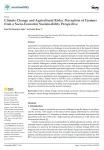Agila F.A.R., Kiraz A. (2025). Climate change and agricultural risks: perception of farmers from a socio-economic sustainability perspective. Sustainability, 02/08/2025, vol. 17, n. 16, p. 7285.
https://doi.org/10.3390/su17167285
https://doi.org/10.3390/su17167285
| Titre : | Climate change and agricultural risks: perception of farmers from a socio-economic sustainability perspective (2025) |
| Auteurs : | F.A.R. Agila ; A. Kiraz |
| Type de document : | Article |
| Dans : | Sustainability (vol. 17, n. 16, August 2025) |
| Article en page(s) : | p. 7285 |
| Langues : | Anglais |
| Langues du résumé : | Anglais |
| Catégories : |
Catégories principales 07 - ENVIRONNEMENT ; 7.6 - Changement ClimatiqueThésaurus IAMM CHANGEMENT CLIMATIQUE ; AGRICULTURE ; RISQUE ; STRATEGIE ; ADAPTATION ; ADAPTATION AU CHANGEMENT ; AGRICULTEUR ; JAMAHIRIYA ARABE LIBYENNE |
| Résumé : | Agriculture is an integral part of human development and sustainability. The agricultural sector has seen critical and severe challenges in recent decades due to the impacts of climate change. Agriculture faces significant challenges, especially in developing countries and geographic regions that are characterized as arid or semi-arid. To ensure the sustainability of agriculture, farmers need to engage in adaptive strategies to tackle climate change and achieve environmentally sustainable farming. Libya is characterized as both a developing country and an arid-to-semi-arid geographic location. Hence, the country's agricultural sector is critically challenged by climate change and an inadequate institutional infrastructure for sustainable agricultural development in the country. This study investigated the climate change adaptations and sustainable agricultural approaches of farmers in Libya, including the impact of the socio-economic dynamics of Libyan farmers on their climate change beliefs, awareness, risk perception, adaptive strategies, and maladaptive strategies. This study carried out a quantitative-style investigation on a sample size of 506 farmers across all regions of Libya. Paired t-tests, an ANOVA, and a correlation analysis were applied to the collected primary data. An analysis of the research results showed a significant correlation among all the research variables and varying degrees of relationships between the socio-economic factors and the research constructs. |
| Cote : | En ligne |
| URL / DOI : | https://doi.org/10.3390/su17167285 |







